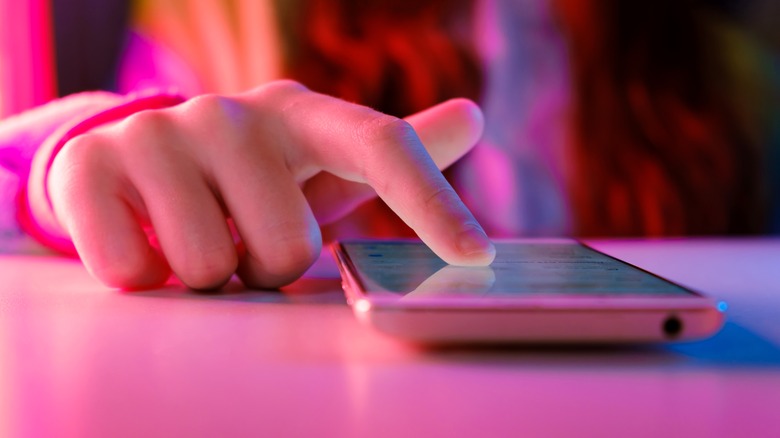How Can The 'Grocery Store Rule' Help You Lead A Healthier Life Online?
Leading a healthy online social life can be tricky as social media platforms are worsening users' mental health to varying degrees. According to Smart Insights, 4.76 billion people use social media, with the average daily use time being over two hours. Per Online Therapy, 58% of Americans believe that social media harms their mental health.
These social platforms often act as an easy escape from our daily mundane tasks or a way to keep tabs as we mindlessly scroll through the pages of distant family members, old friends, and work acquaintances. According to Cosmopolitan, research has proven that social media has increased the maintaining of old relationships that people would have forgotten about. Before social media, it was easier to push people out of mind because we weren't getting virtual updates on their lives. Today, we use social media as an excuse to keep up with people we don't even speak to anymore but may still have some attachment with.
Healthcare professionals at Cone Health advise various strategies to maintain authentic online connections including following people and pages that you genuinely enjoy and utilizing social media as a supporting tactic to nurture your real-life relationships, instead of the other way around. As we get older, real-life relationships can be more difficult to maintain as responsibilities and distance often get in the way. Losing touch with a friend or ex-partner isn't necessarily a bad thing, but the "grocery story rule" will help you to determine if it's healthy to continue following these people on social media.
What is the 'grocery store rule' for social media?
In the early days of social media, platforms were used to connect with people we had active relationships with, but that has changed. We've all had those awkward run-ins with people from our past in public and depending on the relationship, we either say hello or avert eye contact. The "grocery story rule" — referenced on the "Girls With Goals" podcast — is a healthy social media gauge that says that if you would not be excited to see someone at the grocery store and interact with them, then you shouldn't be following them on social media.
The "grocery store rule" can sound a bit harsh at first, but it could also be a game-changer for your mental health. Sometimes, to continue growing, it's best to leave the past behind. Following people that you would avoid in public is done out of habit, yet it does not benefit us in the long run. A common fear that many social media users have is offending those they choose to unfollow, even if the reason isn't malicious. As etiquette expert Diane Gottsman told Reader's Digest, "The apps don't notify people when they are unfriended or unfollowed, and most people have too many friends to worry about checking their lists."
Sometimes it's best to prioritize yourself and hit that unfollow button for good.
What are the benefits of the 'grocery story rule?'
Curating your social media platforms to only show people that you have genuine connections with can truly be beneficial for your mental health. Unfollowing people who are not in your life can free up mental space to engage more with genuine loved ones, allowing for a deeper connection. In addition, unfollowing ex-friends allows you to create a healthy boundary between yourself and the internet. Unfollowing an ex-partner can also allow you to heal faster and genuinely move on to a relationship that is better suited for you.
Creating a healthier social media timeline can even positively impact how you view yourself because whether we like it or not, social media impacts our self-image. It's easy to forget that social media is a highlight reel of life's good moments, with the struggles and hard times often omitted. Though moving on from the past is scary, it's healthier to unfollow those who don't bring you happiness and invest time in finding others who do.


